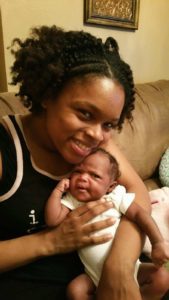I look back on the day I should remember, and sadly I don’t recall much of it. My husband and I were happy but nervous. We were joking around with each other in the delivery room. I had been reading a book of devotions to keep my mind in a peaceful place.
We expected that there would be a process, and we were ready to brave it together.
In the matter of a few hours, which passed like a freight train of minutes, I was:
Checked in.
Examined.
Induced.
Examined again.
Administered drugs.
Monitored.
Informed.
Shaved.
Prepped.
Positioned.
Given an IV.
Arranged.
Cut.
Stapled.
Moved.
…. And ultimately handed a baby that I didn’t recognize as my own. Emotionally paralyzed and ushered into motherhood swiftly and mechanically, I found myself in a distant place. I didn’t make a single choice. I never had the chance. The first photos my husband was able to take of me and our baby were in an elevator post-op.
As I held my daughter in my arms and admired her baby perfection – ten toes, ten fingers, sight, hearing, wrinkly skin – I was so eager to be grateful. Our baby was well. I needed to forget the rest … right?
I have supported, counseled, and encouraged new mothers when they’ve shared their birthing struggles and setbacks. I’ve made myself the sympathetic ear and the encourager of healing. But as I’ve done so, I have been forced to recount and deal with my own birth trauma.

What I can remember about my birth experience is chopped up and thrown together like a salad in a blender. Some pieces of the day stand out as forever recognizable, and others fade into my distant mind like mush. I had planned to shut it all up in a box, seal the lid and banish it to the top shelf of my mental closet, but it keeps coming back. I had questions. I had doubts about the quality of my care. I have concerns that it might happen again.
Fear drove me to put on the brave face of a mother who overcame for the sake of her child. I had been to war within my own body and walked away from the battle with two lives intact. I was congratulated and told that I was going to be a great mother. As my scars healed on the visible parts of me, my inner self was stuck in instant replay.
What I felt and what I went through was real. I was rushed and handled. I wasn’t ready. I didn’t know that I could feel so alone and misunderstood. I wasn’t prepared for the pressure of life saying, “get over and get on with it.” I didn’t know how to balance the feeling of disappointment with the overwhelming love and joy added to my life. I needed to feed my baby and keep her safe. I needed to not be unsure.
In the following weeks, I attempted to get answers. To this day, my husband doesn’t even remember cutting the umbilical cord. He’s working through his own trauma. I received conflicting reports from my doctors. One report said my baby was breech. Another said she wasn’t. It was implied that there would have been a cesarean section “either way” and that I was lucky. I never understood what that meant.
As I attempt to digest and dissect all of this information and these feelings, I look forward to the future and imagine what it would be like to expand my family. I am thrilled that the door is still open for me but also horrified by the unknown. Acknowledgment is the first step toward moving forward, and I am, for the first time, being real with myself about what I experienced.
As health organizations zero in on high birth interventions, cesarean statistics, racial disparities, and mortality rates in the United States, I am thankful that someone is looking and listening. I am thankful that people are concerned that the needs of women aren’t being met. No woman should feel like a non-participant ghosting through her birth experience.
I deserved better.
We all do.












This is such an important topic. I think we often assume because birth is a common experience it’s not traumatic. Thank you for sharing.
Yes! And the sad thing is once I became a La Leche League Leader, I had so many conversations with moms that made me so sad. Women often open up after having healthy babies and they have things that have been done to them, said to them, done without their consent, etc. and it leaves a mark.
Thank you for sharing Stephanie! It’s really sad when the doctors think they can make all the decisions for you regarding child birth without your input on what you really prefer. It’s TRUE they are the professionals but sometimes they just have to listen to a mothers instinct. Giving birth is traumatic enough, they shouldn’t make it worst!
Thank you! Your feedback means a lot.
(This post caught my attention, but I read through several of your posts. You have a beautiful voice! Keep writing and advocating for those around you!) What a powerful story you have! So sorry you had to go through so much, but your trauma echoes many others. May you find healing as you share.
Thank you for the feedback! I wrote that post months ago and sat on it for a while. It was hard to write but therapeutic as well.
Comments are closed.